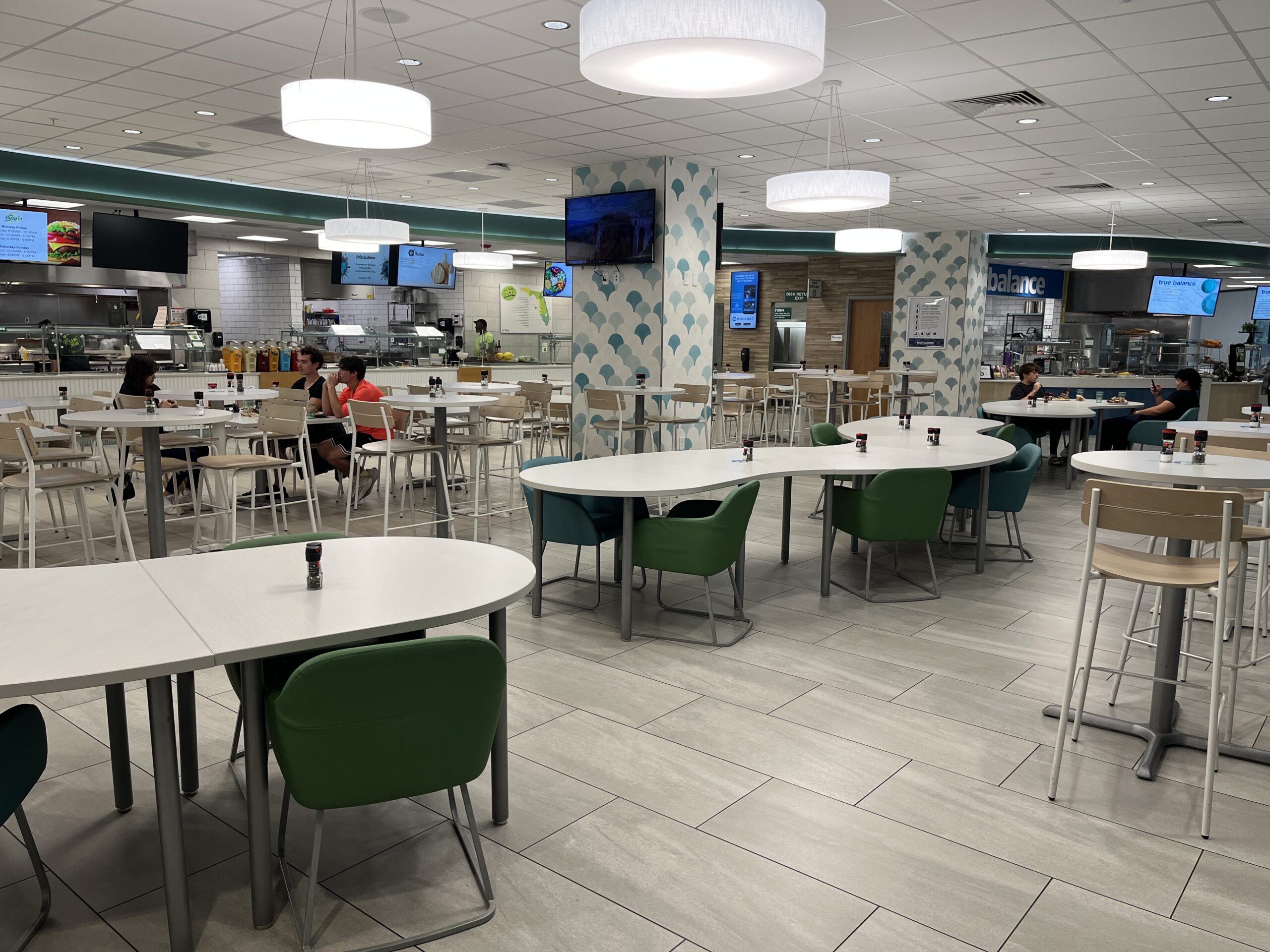Photo by Alisha Durosier | The Crow’s Nest
By Alisha Durosier
After ending its 22-year partnership with Aramark last October, the University of South Florida is transitioning its facilities and dining services to be managed under Compass Group USA.
The 15-year partnership began on Dec. 1, when Southeast Services Corporation, a subdivision of Compass Group, took over facilities.
Compass spokesperson Meredith Rosenberg told The Crow’s Nest that as USF begins to transition its dining services, Compass “is committed to minimizing any disruptions to dining hall operations to ensure a smooth and seamless experience for all guests.”
With Chartwells — another branch of Compass Group — set to take over USF’s food operations this summer, USF St. Petersburg students see the change as an opportunity for the university to address their concerns about on-campus dining – especially at The Nest, the campus’ only dining hall.
“I feel like there aren’t enough vegetarian options,” said marine biology freshman Arabelle Calderon. “The options that we have aren’t that great.”
Students want more variety, whether through new themed stations — like a pasta bar, as Calderon suggests — or improvements to existing menu options.
“I would like to see a reduction in pork and beef being served,” said sustainability studies junior Estela Najera. “At least have one white meat… we can’t have all pork, all beef.”
According to students with dietary restrictions, specifically vegans and students with extensive allergies or a gluten intolerance, the existing menu options don’t allow them as much flexibility as they would like.
Some picky eaters like biology freshman Devin Saulnier, share the same sentiment.
“I think some nights… it’s very hard to eat some of the meals,” said Saulnier, who relies on a go-to meal when The Nest doesn’t have options she enjoys.
Consistency is a common concern among students, many of whom hope Chartwells will provide food they can rely on night after night.
For biology junior Aria Douglas, she believes students should be fed what they want and as much as they need. “Because we are paying for it,” she said.
In The Nest a QR code is pasted onto the center of each table, prompting students to scan and provide feedback, and to make their food requests and concerns known.
Douglas hopes the new company will be more committed to incorporating student input.
“We’ve put in a lot of requests for things that we’ve had in the past, that we’ve really liked and wanted to see again. And then we actually never got to see them come to fruition,” she said.
Psychology junior Violet Adams hopes the incoming company will prioritize sustainability, emphasizing that it goes hand in hand with providing good food options.
“With our food waste in general, I think a lot of that could be mitigated if they listen to the things that we actually like to eat,” Adams said.
Student Green Energy Fund chair Oliver Laczko notes that as Aramark has taken the steps to reducing food waste in the past — including being a stakeholder in SGEF’s USDA grant application to implement an industrial composter behind The Nest — he doesn’t have many doubts that Chartwells will follow suit.
“Since knowing that Chartwells was coming in, our leadership has never really worried about the fact about working with them, we have a feeling like this is going to be a pretty solid relationship we can build,” Laczko said.
Along with sustainability efforts, students are also looking for more flexibility with meal plans, more transparency, extended dining hours, and hope that USF dining employees aren’t impacted negatively by the transition.
According to Katryna Wolfrom, the Florida regional marketing manager for Chartwells, the company’s first full year at USF will be used to examine the structure in place.
“Year one, we’re not really doing any changes to the structure or the way the meal plan works,” Wolfrom said at the Feb. 4 student town hall. “When we keep it the same we get to actually analyze it, versus just come in and ‘here is what we think we should be doing’ without any data-driven decisions.”
Compass Group told The Crow’s Nest that it is “eager to connect with students and the university community to gather input and develop a program tailored to USF’s unique needs and preferences.”
The company also asserted that students can expect “a variety of new and familiar menus featuring globally-inspired cuisines, seasonal ingredients, and locally sourced foods that bring fresh, sustainable options to the table.”
Highlighting the use of on-site dietitians and foodservice professionals who will collaborate with students with various dietary restrictions to implement “clearly labeled menus” and “dedicated allergen-free prep areas,” USF maintains the its overall goal is to “to create a welcoming dining experience where every student feels included and cared for.”
USF’s dining services are set to be fully transitioned by July 1, 2025.



